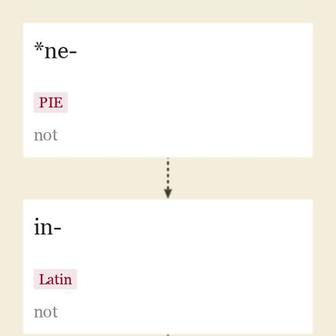impossible (adj.)
14世纪晚期,源自于古法语 impossible(14世纪),源自于拉丁语 impossibilis “不可能的”,由 in-(见 in-(1))的同化形式和 possibilis(见 possible)组成。19世纪中期开始出现“无法完成或容忍”的弱化意义。相关词汇: Impossibly。
最早记录年份: late 14c.
impossible 的相关词汇
in- (1)

这个词缀的意思是“不,相反,没有”(也可以是通过与后面的辅音音节化的 -n- 的同化而来的 im-, il-, ir-,这种趋势始于后期拉丁语),源自拉丁语 in- “不”,与希腊语 an-,古英语 un- 同源,均来自 PIE 词根 *ne- “不”。
在古法语和中古英语中,通常使用 en-,但大多数这些形式在现代英语中已经不再使用,只有极少数(例如 enemy)不再被视为否定的。在英语中的经验法则是,对于明显的拉丁语元素使用 in-,对于本土或本土化的元素使用 un-。
possible (adj.)
"可能存在、发生或被完成的",14世纪中叶,源自古法语 possible,直接源自拉丁语 possibilis,意为"可以完成",源自 posse "有能力"(参见 potent)。
The only kind of object which in strict propriety of language can be called possible is the truth of a proposition ; and when a kind of thing is said to be possible, this is to be regarded as an elliptical expression, meaning that it is of such a general description that we do not know it does not exist. So an event or act is said to be possible, meaning that one would not know that it would not come to pass. But it is incorrect to use possible meaning practicable ; possible is what may be, not what can be. [Century Dictionary]
在严格的语言准确性中,唯一可以称为 possible 的对象是一个命题的真实性; 当一种 thing 被称为 possible 时,这应被视为一种省略表达,意思是它是这样一种一般性描述,我们不知道它不存在。因此,一个事件或行为被称为 possible,意思是我们不知道它不会发生。但是,使用 possible 来表示 practicable 是不正确的; possible 是可能发生的,而不是可以发生的。[世纪词典]
- impossibilism
- impossibility